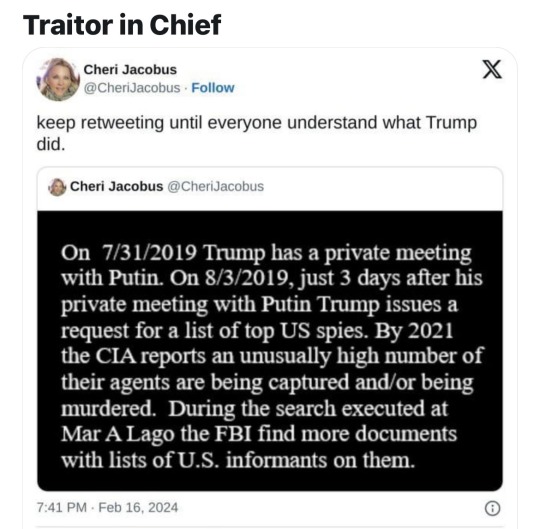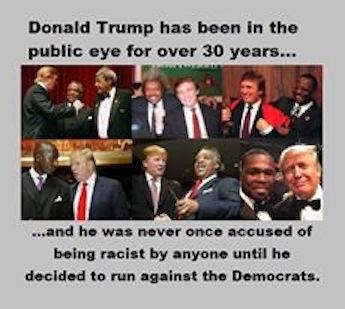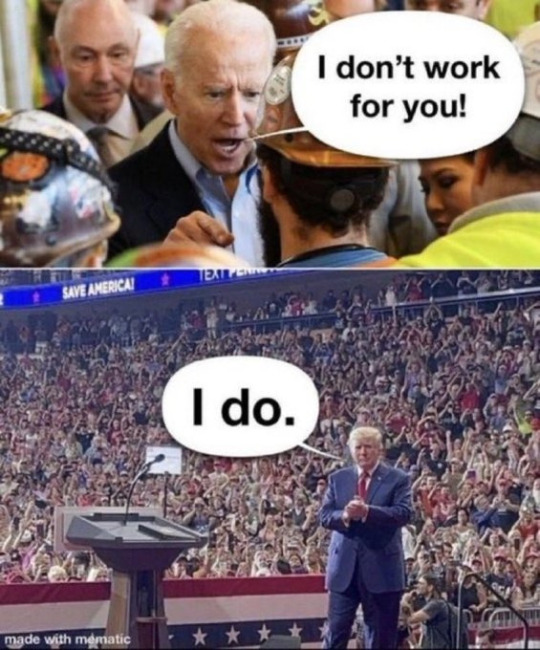#Trump Presidency
Text
This thought provoking, unflinching 2020 documentary about the psychology of Donald Trump is a must see (especially for those that support him). Four years later and what was revealed in this documentary is even more poignant.
It’s discouraging that the people who need to watch it won't.
The entire doc is available on Amazon and Apple TV.
youtube
#donald trump#unfit#psychology#documentary#insight#trump supporters#watch it#trump presidency#vote blue#joe biden#narcissistic traits#president trump#maga#Youtube
41 notes
·
View notes
Text
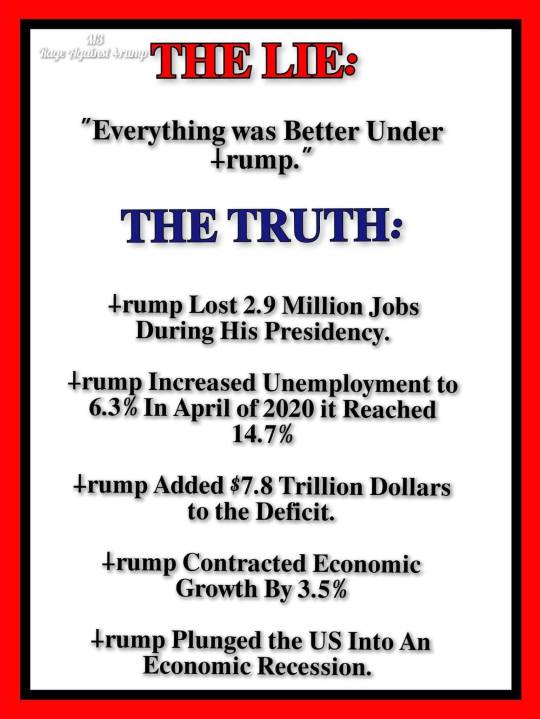
The temper tantrums will come.
#trump presidency#donald trump#Dint believe the lies#Hate is more important than the economy#MAGAt bait
17 notes
·
View notes
Text
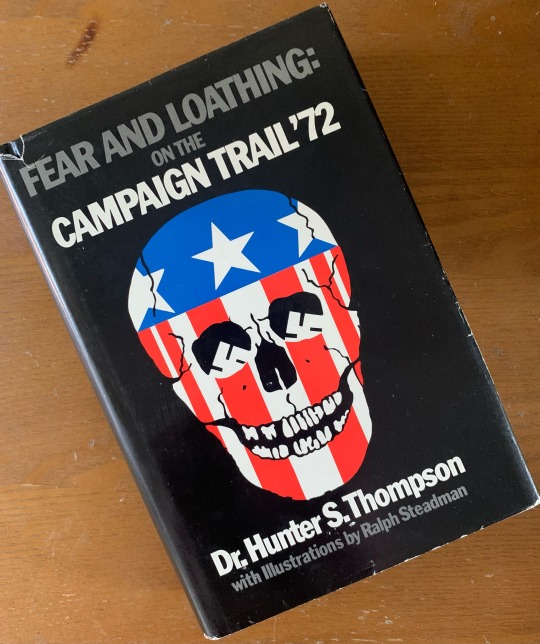
“The main problem in any democracy is that crowd pleasers are generally brainless swine who can go out on a stage & whup their supporters into an orgiastic frenzy - then go back to the office & sell every one of the poor bastards down the tube for a nickel apiece. Probably the rarest form of life in American politics is the man who can turn on a crowd & still keep his head straight - assuming it was straight in the first place.
Which harks back to McGovern's problem. He is probably the most honest big-time politician in America; Robert Kennedy, several years before he was murdered, called George McGovern "the most decent man in the Senate." Which is not quite the same thing as being the best candidate for President of the United States. For that, McGovern would need at least one dark kinky streak of Mick Jagger in his soul . . .
Not much, & perhaps not even enough so people would notice at lunch in the Capitol Hill Hotel or walking down the hallway of the Senate Office Building - but just enough to drift out on the stage in front of a big crowd & let the spectacle turn him on.
That may be the handle. Maybe the whole secret of turning a crowd on is getting turned on yourself by the crowd. The only candidate running for the presidency today who seems to understand this is George Wallace which might at least partially explain why Bobby Kennedy was the only candidate who could take votes away from Wallace in '68. Kennedy, like Wallace, was able to connect with people on some kind of visceral, instinctive level that is probably both above & below "rational politics." (page 127)
“McGovern's brain-trust, though, had come up with the idea that the Wallace vote was "soft” - that the typical Wallace voter, especially in the North and Midwest, was far less committed to Wallace himself than to his thundering, gut-level appeal to rise up and smash all the "pointy-headed bureaucrats in Washington" who'd been fucking them over for so long.
The root of the Wallace magic was a cynical, showbiz instinct for knowing exactly which issues would whip a hall full of beer-drinking factory workers into a frenzy - and then doing exactly that, by howling down from the podium that he had an instant, overnight cure for all their worst afflictions: Taxes? Nigras? Army worms killing the turnip crop? Whatever it was, Wallace assured his supporters that the solution was actually real simple, and that the only reason they had any hassle with the government at all was because those greedy bloodsuckers in Washington didn't want the problems solved, so they wouldn't be put out of work.
The ugly truth is that Wallace had never even bothered to understand the problems - much less come up with any honest solutions - but "the Fighting Little Judge" has never lost much sleep from guilt feelings about his personal credibility gap. Southern politicians are not made that way. Successful con men are treated with considerable respect in the South. A good slice of the settler population of that region were men who'd been given a choice between being shipped off to the New World in leg-irons and spending the rest of their lives in English prisons. The Crown saw no point in feeding them year after year, and they were far too dangerous to be turned loose on the streets of London - so, rather than overload the public hanging schedule, the King's Minister of Gaol decided to put this scum to work on the other side of the Atlantic, in The Colonies, where cheap labor was much in demand.
Most of these poor bastards wound up in what is now the Deep South because of the wretched climate. No settler with good sense and a few dollars in his pocket would venture south of Richmond. There was plenty of opportunity around Boston, New York, and Philadelphia - and by British standards the climate in places like South Carolina and Georgia was close to Hell on Earth: swamps, alligators, mosquitos, tropical disease . . . all this plus a boiling sun all day long and no way to make money unless you had a land grant from the King.
So the South was sparsely settled at first, and the shortage of skilled labor was a serious problem to the scattered aristocracy of would-be cotton barons who had been granted huge tracts of good land that would make them all rich if they could only get people to work it.
The slave-trade was one answer, but Africa in 1699 was not a fertile breeding ground for middle-management types . . . and the planters said it was damn near impossible for one white man to establish any kind of control over a boatload of black primitives. The bastards couldn't even speak English. How could a man get the crop in, with brutes like that for help?
There would have to be managers, keepers, overseers: white men who spoke the language, and had a sense of purpose in life. But where would they come from? There was no middle class in the South: only masters and slaves and all that rich land lying fallow.
The King was quick to grasp the financial implications of the problem: The crops must be planted and harvested, in order to sell them for gold - and if all those lazy bastards needed was a few thousand half-bright English-speaking lackeys in order to bring the crops in . . . hell, that was easy: Clean out the jails, cut back on the Crown's grocery bill, jolt the liberals off balance by announcing a new "Progressive Amnesty" program for hardened criminals . . .
Wonderful. Dispatch royal messengers to spread the good word in every corner of the kingdom; and after that send out professional pollsters to record an amazing 66 percent jump in the King's popularity . . . then wait a few weeks before announcing the new 10 percent sales tax on ale.
That's how the South got settled. Not the whole story, perhaps, but it goes a long way toward explaining why George Wallace is the Governor of Alabama. He has the same smile as his great-grandfather - a thrice-convicted pig thief from somewhere near Nottingham, who made a small reputation, they say, as a jailhouse lawyer, before he got shipped out.
Indeed. With a bit of imagination you can almost hear the cranky litle bastard haranguing his fellow prisoners in London's infamous Hardcase jail, urging them on to revolt:
"Lissen here, you poor fools! There's not much time! Even now up - there in the tower - they're cookin up some kind of cruel new punishment for us! How much longer will we stand for it? And now they want to ship us across the ocean to work like slaves in a swamp with a bunch of goddamn Hottentots!
"We won't go! It's asinine! We'll tear this place apart before we'll let that thieving old faggot of a king send us off to work next to Africans!
"How much more of this misery can we stand, boys? I know you're fed right up to here with it. I can see it in your eyes - pure misery! And I'm tellin' you, we don't have to stand for it! We can send the king a message and tell him how we feel! I'll write it up myself, and all you boys can sign it . . . or better still, I'll go talk to the king personally! All you boys have to do is dig me a little tunnel under the wall over there behind the gallows, and I'll . . . “
Right. That bottom line never changes: "You folks be sure and come to see me in the White House, you hear? There'll be plenty of room for my friends, after I clean house . . . but first I need your vote, folks, and after that I'll . . . “
George Wallace is one of the worst charlatans in politics, but there is no denying his talent for converting frustration into energy. What McGovern sensed in Florida, however - while Wallace was stomping him, along with all the others - was the possibility that Wallace appealed instinctively to a lot more people than would actually vote for him. He was stirring up more anger than he knew how to channel. The frustration was there, and it was easy enough to convert it - but what then? If Wallace had taken himself seriously as a presidential candidate - as a Democrat or anything else - he might have put together the kind of organization that would have made him a genuine threat in the primaries, instead of just a spoiler.” (pages 274 - 278)
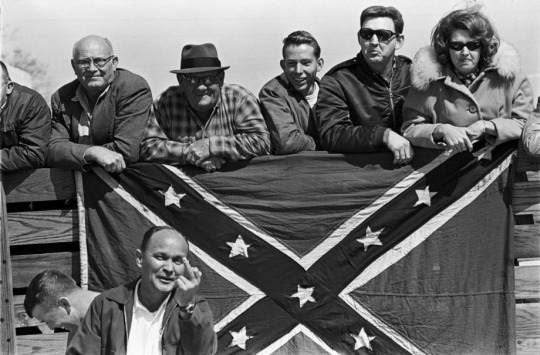
#thompson#hunter s thompson#fear and loathing#1972#nixon#richard nixon#mcgovern#george mcgovern#george wallace#the south#segregation#robert kennedy#1968#trump#trump presidency
13 notes
·
View notes
Text
youtube
0 notes
Text
Another of his mental impediments.

March 28, 2024
One of the many drawbacks of Donald Trump's limited intelligence is that he's unable to foresee the consequences of his actions. Living always in the moment, he is focused only on getting through today. Thus, he is simply incapable of either comprehending the effects of current decisions or anticipating future outcomes.
Nowhere was this more in evidence than in the lead-up to the COVID-19 pandemic. In 2018, Trump ordered the disbanding of the National Security Council's Global Health Security and Biodefense unit. A year later, the position of CDC epidemiologist embedded in China’s disease control agency was eliminated. And just three months before the coronavirus began infecting people in China, his administration decided to end a $200 million early warning program, called Predict, designed to alert potential pandemics.
Trump shut down these programs only because they originated under the despised President Obama. And without a moment's thought concerning any possible ramifications. Such as COVID-19 becoming the third leading cause of death in the US in 2020, with a death rate of 1,027 per 100,000 population and over a million dead between January 2020 and June 2023.
Then there was the time Trump, abetted by an eager Republican Congress, pushed through the 2017 Tax Cuts and Jobs Act, which significantly lowered the top tax rate for high-income earners and slashed the corporate rate to 21%. Wealthy GOP donors loved it, but little attention was given to the resultant economic inequality. Said the Brookings Institution's Tax Policy Center at the time:
When it is ultimately financed with spending cuts or other tax increases, as it must be in the long run, TCJA will, under the most plausible scenarios, end up making most households worse off than if TCJA had not been enacted.
Trump's tariffs on foreign goods and his rejection of international treaties may have seemed like good America First ideas at the time. But the former resulted in increasing prices for American consumers and destroying markets for American farmers, while the latter isolated us from our allies and endangered our national security. Trump evidently didn't see any of that coming.
Even today, Trump puts forward superficially attractive, but ill-considered policies. Like a 100% tariff on cars manufactured outside the US, which would make them cost twice as much. He also promises to deport eight million immigrants, which would devastate the US economy by depriving it of a sizable portion of its workforce. So, if you hear Trump's proposals and wonder what he could possibly be thinking, the answer is, as usual, he isn't.
0 notes
Text
Do Americans Notice the Hypocrisy?
Yep, they sure do.
But you can be forgiven for thinking otherwise. Media of all stripes tends to play up the egregious and the stupid. The left assures us all conservatives are mouth breathing morons that hate democracy and science. The right shows us blue haired crazies spouting that nonsense. Free speech is dangerous in the wrong hands and yet the blue haired crazies are out to save��

View On WordPress
#American media#Democratic Party#Election dynamics#Hypocrisy in politics#Joe Biden#Media bias#Political awareness#Political discourse#Public trust#Trump presidency
0 notes
Text
The New Trend: Civil War in '24
Dive into my latest blog for an eye-opening discussion on a Prophet Article and the 'Civil War' movie - a bold portrayal of a divided America that's more plausible than you think! #CivilWarMovie #PoliticalCinema
Amazing generation of the US using DALL-E – Contact me if you want the prompt I used..
Have you been hearing repetitive messages about a looming civil war in 2024? I keep hearing about it – in the media, and seemingly, also in theaters (I watched a trailer this weekend for a movie called “Civil War” that comes out next year.
First, this Newsweek article is predicting how it goes down.
A…

View On WordPress
#Alex Garland#American democracy#American Society#California-Texas Alliance#civil war#Civil War Movie#constitutional republic#Fictional Civil War#Historical Analysis#Historical Precedents#MAGA movement#political commentary#Political Discourse#Political Film#Political Tensions#prophecy#Trump presidency#US government
0 notes
Text
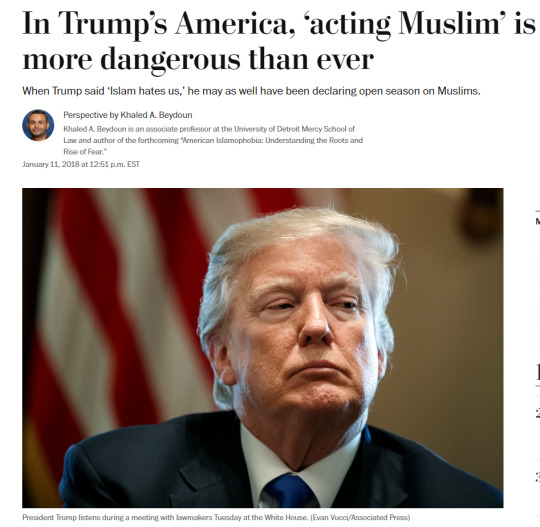
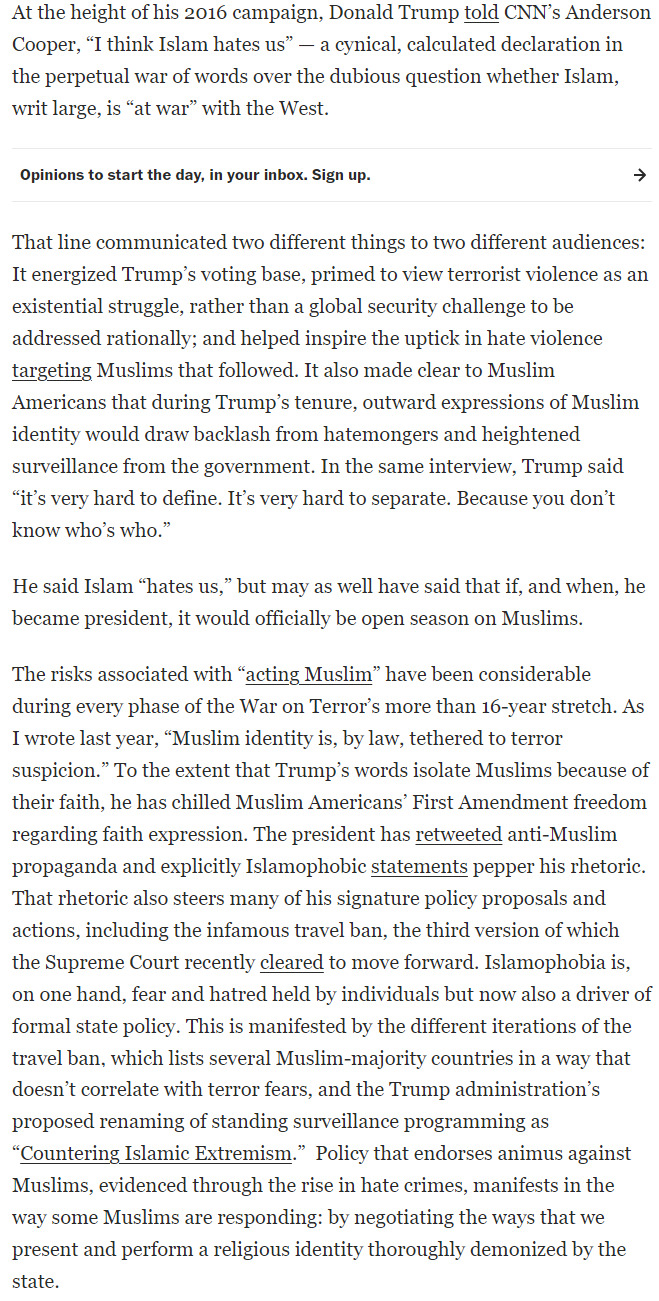

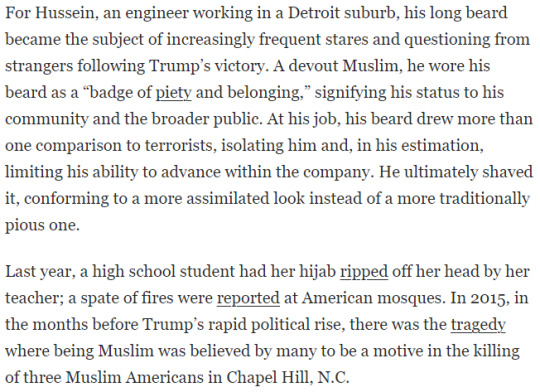

This post in in relation to THIS post
------------------------------------------------------------------------------
[id: all text from article:
In Trump’s America, ‘acting Muslin’ is more dangerous than ever
When Trump said ‘Islam hates us,’ he may as well have been declaring open season on Muslims.
Perspective by Khaled A. Beydoun
Khaled A. Beydoun is an associate professor at the University of Detroit Mercy School of Law and author or the forthcoming “American Islamophobia: Understanding the Roots and Rise of Fear.”
January 11, 2018 at 12:51p.m. EST
[picture of Trump]
At the height of his 2016 campaign, Donald Trump told CNN’s Anderson Cooper, “I think Islam hates us” – a cynical, calculated declaration in the perpetual war of words over the dubious question whether Islam, writ large, is “at war” with the West.
That line communicated two different things to two different audiences: It energized Trump’s voting base, primed to view terrorist violence as an existential struggle, rather than a global security challenge to be addressed rationally; and helped inspire the uptick in hate violence targeting Muslims that followed. It also made clear to Muslim Americans during Trump’s tenure, outward expression of Muslim identity would draw backlash from hatemongers and heightened surveillance from the government. In the same interview, Trump said “it’s very hard to define. It’s very hard to separate. Because you don’t know who’s who.”
He said Islam “hates us,” but may as well have said that if, and when, he became president, it would officially be open season on Muslims.
The risks associated with “acting Muslim” have been considerable during every phase of the War on Terror’s more than 16-year stretch. As I wrote last year, “Muslim identity is, by law, tethered to terror suspicion.” To the extent that Trump’s words isolate Muslims because of their faith, he has chilled Muslim American’s First Amendment freedom regarding faith expression. The president has retweeted anti-Muslim propaganda and explicitly Islamophobic statements pepper his rhetoric. That rhetoric also steers many of his signature policy proposals and actions, including the infamous travel ban, the third version of which the Supreme Court recently cleared to move forward. Islamophobia is, on one hand, fear and hatred held by individuals but now also a driver formal state policy. This is manifested by the different iterations of the travel ban, which lists several Muslim-majority countries in a way that doesn’t correlate with terror fears, and the Trump administration’s proposed remaining and standing surveillance programming as “Countering Islamic Extremism.” Policy that endorses animus against Muslims, evidenced through the rise of hate crimes, manifests in the way some Muslims are responding: by negotiating the ways that we present and perform a religious identity thoroughly demonized by the state.
These negotiations are unfolding within the private confines and minds of Muslims, largely under the radar of media converge and frequently unseen by the public eye. Muslims are being forced to choose between confirming their Muslim identities in line with their religious belief and, in turn, leaving themselves vulnerable to hate violence and state suspicion. Or concealing their Muslim identities, conforming and, at least in theory, trading their rights for safety.
Alaa Basatneh chose to cover her Muslim identity by uncovering. In 2016, she wrote for Splinter that “Immediately after Donald Trump was elected president, I decided to stop wearing my hijab.” She was motivated to try to find safe haven from the wave of violence targeting covered Muslim women – the most readily identifiable Muslims – who wind up as primary targets of Islamophobic violence.
[Trump said Obama’s nuclear deal would empower Iran. He’s wrong.]
For Hussein, an engineer working in a Detroit suburb, his long beard became the subject of increasingly frequent stares and questioning from strangers following Trump’s victory. A devout Muslim, he wore his beard as “a badge of piety and belonging,” signifying his status to his community and the broader public. At his job, his beard drew more than one comparison to terrorists, isolating him and, in his estimation, limiting his ability to advance within the company. He ultimately shaved it, conforming to a more assimilated look instead of a more traditionally pious one.
Last year, a high school student has her hijab ripped off her head by he teacher; a spate of fires were reported at American mosques. In 2015, in the months before Trump’s rapid political rise, there was the tragedy where being Muslim was believed by many to be a motive in the killing of three Muslim Americans in Chapel Hill, N.C.
Strategic concealment of stigmatized identity is not exclusive to Muslim communities. For instance, otherwise devout Sikh men may remove their turbans or shave their beards to fend off discrimination, and black men and women may avoid specific hairstyles or attire to deflect stereotyping of mitigate the prospect of police profiling.
“Everybody works their identity,” write law professors Devon Carbado and Mitu Gulati in their 2000 Cornell Law Review paper, “Working Identity,” examining the ways that professionals of color negotiate their racial identities within the employment context. They argue that the “working identity phenomenon … is a form of employment discrimination,” because concealment of modification of identity in ways that lessen racial, gender and intersectional stereotypes facilitate acceptance and upward mobility in the employment context. When you extend that perspective to the acting Muslim phenomenon, we can see it as a form of religious discrimination.
For Muslims navigating how to present themselves and practice their faith in a society that where Islamophobia is both percolating from the bottom and reigning at the very top, the stakes are more than getting and holding a coveted job or breaking through glass ceilings. It is a matter of weathering the immediate threat posed by the Trump administration, which will undoubtedly continue to peddle hateful rhetoric and push more damaging policy.
Hate crime reports and statistics don’t capture the full scope of hostility towards Muslims in our country. And if the law is too limited to enable redress for Muslims suppressing their religious identity to mitigate backlash and rebut suspicion, it may be time to rethink it. If one of the touchstones of American citizenship is the free exercise of religion, and Muslims are unable to fully practice that liberty in a context of trumped-up Islamophobia, then the law serves to maintain the second-class citizenship of Muslims in America. /id]
#donald trump#muslim#arabic#middle east#islam#muslim american#president#politics#islamophobia#trump presidency#racism#first amendment#religion#discrimination
0 notes
Text
THE LEFT WAS RIGHT! | Armageddon Update | Christopher Titus
youtube
"Never give a sucker an even break." W. C. Fields
0 notes
Text
Holly - Stephen King Review

** spoiler alert **
So in the afterward of Stephen King's newest novel, Holly (a continuation of the character Holly Gibney that first appeared in The Bill Hodges Trilogy, then The Outsider and the novella collection If It Bleeds and I believe is now his most written character other than Roland Deschain and the Ka-tet), Stephen King says that while Holly Gibney shares many of his own political beliefs and thoughts on life in the post-Trump Presidency and the time period when Covid was a national conversation, he hopes that if he were writing the opposite perspective, that he would be able to give that perspective justice. I don't know that I agree.
It doesn't take more than a brief glance at Stephen King's twitter feed to confirm that the man is obsessed with politics in the Trump era and specifically with Donald Trump himself. It could be he has always been this way and having easier and quicker access to his thoughts via social media confirms that, it's hard to say. It's clear to anyone who has ever read any one of his books, that Stephen King is a liberal. Always has been from when Carrie was published through now. So if you're reading a Stephen King book and you're mad that he's mad about Trump, then you're the problem. Not him.
I guess where I fall on this and granted, I haven't read everything of his (I've read 56 of his novels/short story collections and am working on the rest) is I feel he's gotten less adept at writing about politics, particularly in his fictional work (and his tweets to me read like MSNBC headlines, all bark no bite unlike Cujo). Like I said, he's always trashed republican politicians, even going back to the Reagan Administration, but he used to be so great at finding the voice of the modern, every day average person, regardless of that persons political view, they were a fleshed out character, that from their point of view, you could understand why they think the way they do.
I've only read If It Bleeds, Later and Holly in the Trump era (I think The Outsider was probably written before Trump), but I'm fairly positive Trump shows up in every one of those books, if only by name and every Trump supporting character is unintelligent, described in a way that gives them some sort of gross deformity or they're straight up evil. There's no attempt at examining why someone might support Donald Trump, beyond the fact that they're clearly just into authoritarianism.
There's no acknowledging the very real idea that at least in 2016, there was a group of Bernie supporters that also supported Donald Trump, because they were both espousing populist ideas. I know a lot of highly intelligent people that support Trump, but have reservations about the man himself, his actions, tweets, but love his policies. But even horrific politicians in his previous books, guys who in their respective stories like Greg Stillson, do even worse things (uh hello global nuclear war) than what Trump did in actuality, there's a kernel of understanding that Stephen King writes into them. It gives us interest and like/hate in those characters.
So yeah, it's impossible not to not talk about this, because it's such a glaring thing in the book. I don't think wrongly. In the period Holly takes place, Donald Trump, Joe Biden and Covid were large topics (I feel the same way about his treatment of unvaccinated people (I have the latest booster FYI so I'm completely vacc'd), he doesn't seem to understand there are reasons why someone might be unvaccinated other than to "own the libs"). So that out of the way...
Holly Gibney of the Finders Keepers private detective agency has a new case. Bonnie Dahl has gone missing and her mother Penny has hired Holly, based on recommendations, to find her missing daughter. Initially reluctant to take the case because she had recently lost her own mother due to complications with Covid and her own proclivities, Holly begins to look into the case, to discover that several people have gone missing in that area.
Meanwhile, Professors Rodney and Emily Harris, an elderly couple that are semi-retired, have a dark secret hidden in their basement.
Okay. So I do *not* feel this is a spoiler. Stephen King intentionally lets you know, just as he did in Mr. Mercedes, very quickly who the killer(s) are. That's certainly a method. One that, for me, Stephen King doesn't do a great job at fulfilling here. While yes, I'm, sickened by what the killer of Mr. Mercedes did, or the Harris' do here in Holly, there's no tension for me. There's not a second of this book, especially with how much Stephen King has talked about in interviews and the like, that I'm worried for Holly Gibney. I know she'll have some scars mentally and physically, but I know she's going to make it through.
I *liked* this book. I didn't love it. It was sort of middling Stephen King for me. I think where it misses the mark for me is the "Alfred Hitchcock bomb under the table" method of storytelling, where I think Hitchcock is a master at, these pseudo detective stories that Stephen King has been doing, I'm not sure they click for me in the way that he wants them to. And again, King used to be a master at this with things like "That was the last time they ever saw __________ alive". The reveals of the killers here and in Mr. Mercedes just undercuts the tension for me. There's nothing from them in the way that Stephen King has been great at in the past (making amazing, sympathetic villains). They're doing horrific stuff for minimal gains it seems like, they're what, if what they believe *is* true, which the novel undercuts, then they're extending their lives by a few years at best. That's just not all that interesting for me
Where the book does work and for me it's the same thing as in If It Bleeds, is the character of Holly Gibney. I'm with King in that she's one of the best things that he's done in the last decade. I'm just not completely on board with this having been a story worthy of Holly. Especially a titular story. I don't know that we learned anymore about Holly here than we did in previous stories with her. In fact I don't feel like there's a lot of character development at all for Holly, she's much the same at the beginning and end of the novel.
One of the reasons I *liked* the novel is the interactions between Jerome and Vera Steinman. I thought that was one aspect of the story where King absolutely nailed what he was going for here. The horror of the situation, the grief and impact of losing a loved one in a horrific way. I loved every time those two characters were with one another and would love to see Jerome, especially with his life taking off, expanded upon further.
Lastly, I feel like I'm confused about Holly's age. I don't know if it's because of the actors who have portrayed her, but my impression of Holly in The Outsider and If It Bleeds was that she was in her thirties. Was there a time skip that I'm not aware of, because King clearly states that she is in her early fifties here.
So yeah, I feel like I was mostly critical here. I'm sure many people will disagree with my thoughts here. But I love Stephen King and his works. Even when I disagree with him (not even saying I disagree with him in many topics that he covers in Holly, just don't think he was successful for me in conveying these topics). I wouldn't have read as much of him as I have if I were not. So if you liked Mr. Mercedes and that trilogy, then I would recommend Holly. If you were more into the supernatural aspects of The Outsider and If It Bleeds, well, maybe you'd be a little more middling to Holly like myself.
3/5
#halloween reading 2023#horror#horror novel#horror fiction#holly#holly gibney#stephen king#the bill hodges trilogy#the outsider#if it bleeds#trump presidency#covid#covid19#twitter#x#msnbc#cujo#reagan administration#authoritarianism#bernie#greg stillson#the dead zone#donald trump#joe biden#president biden#booster#finders keepers detective agency#finders keepers#bonnie dahl#penny dahl
0 notes
Photo
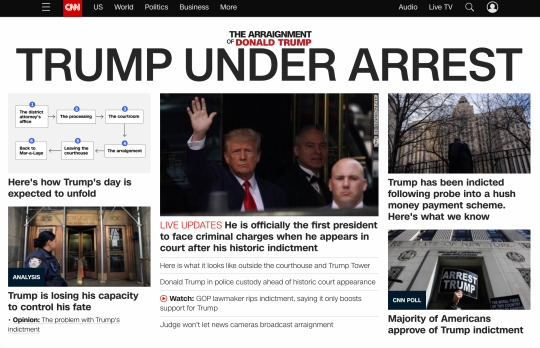
History.
April 4, 2023.
8K notes
·
View notes
Text
How he plans to wreck the economy.
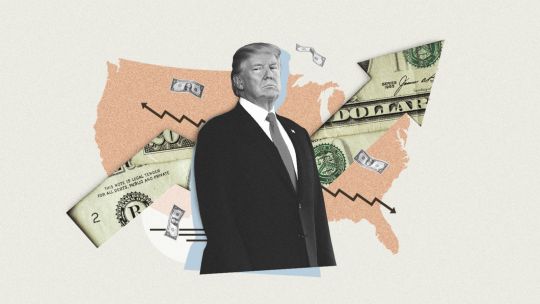
March 7, 2024
Most of the alarm over a second Donald Trump presidency revolves around his authoritarian fantasies of turning the office into a dictatorship and using it to extinguish the criminal prosecutions against him, sic the justice system on his perceived enemies, jettison the Constitution, and deport or imprison migrant refugees (starting, he says, with "the bad ones").
Meanwhile, little attention is being paid to the potential damage a Trump 2.0 could have on the American economy. The LA Times suggests one possibility:
Trump hasn’t outlined much of an economic program, but he has promised to impose a massive increase in tariffs on imports from almost all foreign countries — everything from bananas and baby formula to computer chips and machine parts.
Trump, of course, still doesn't have any idea how tariffs work. He continues to believe other nations pay the taxes on imported goods and not the buyers of them (like Walmart shoppers and American companies that depend on foreign products). Trump regales gullible GOPers with tales of how his trade wars brought billions of dollars into the US Treasury — money that actually came out of the pockets of American consumers and businesses.
Thus, the clueless economic ignoramus has announced his intention to compound his error (if elected) with a worldwide 10% tariff. And, just like last time, his proposed tariffs will curb investment growth and spur unemployment. As ABC News observed,
In all, the U.S. levied tariffs on thousands of products valued at approximately $380 billion in 2018 and 2019, according to an analysis by the nonprofit Tax Foundation. Trump's tariffs decreased U.S. employment by 166,000 jobs, the group found, citing increased import costs for U.S. employers.
Trump's plans to reverse America's currently robust economic growth (thanks, President Biden) also include reducing the labor supply by cracking down on immigration and deporting workers already here, expanding the budget deficit with more tax cuts, and gutting federal agencies charged with protecting workers and regulating markets.
In addition, the AP reports that he has proposed "a four-year plan to phase out Chinese imports of essential goods, including electronics, steel and pharmaceuticals." And, according to The Washington Post, "Trump has lately signaled plans to strong-arm the Fed if he recaptures the White House and force it to cut rates."
In a televised interview in January, Trump said he hoped an economic crash would come in 2024 because "I don't want to be Herbert Hoover." But if he ever gets to carry out his moronic plans for our economy, he'll make Hoover look good.
0 notes
Text
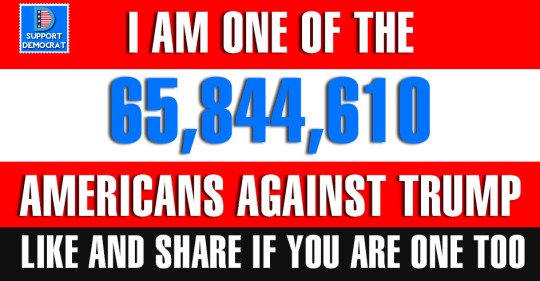
I am still AGAINST #orangeJesus -
Trump is a traitor, conman, grifter, sexual predator, bully, liar, cheat, thief, and a narcissist child that never grew up.
disgraced, twiced impeached, 4X indicted, 91 felonies, multi civil lawsuits,
That is why I still stand against this soulless criminal #ChumpTrump
#democrats#republicans#trumpchumps#donald trump#democracy#ivanka trump#doj#scotus#trumpdavidians#rachel maddow#president joe biden#vp kamala harris#melania trump#tiffany trump#eric trump#donjr trump#laratrump#jaredkushner
2K notes
·
View notes
